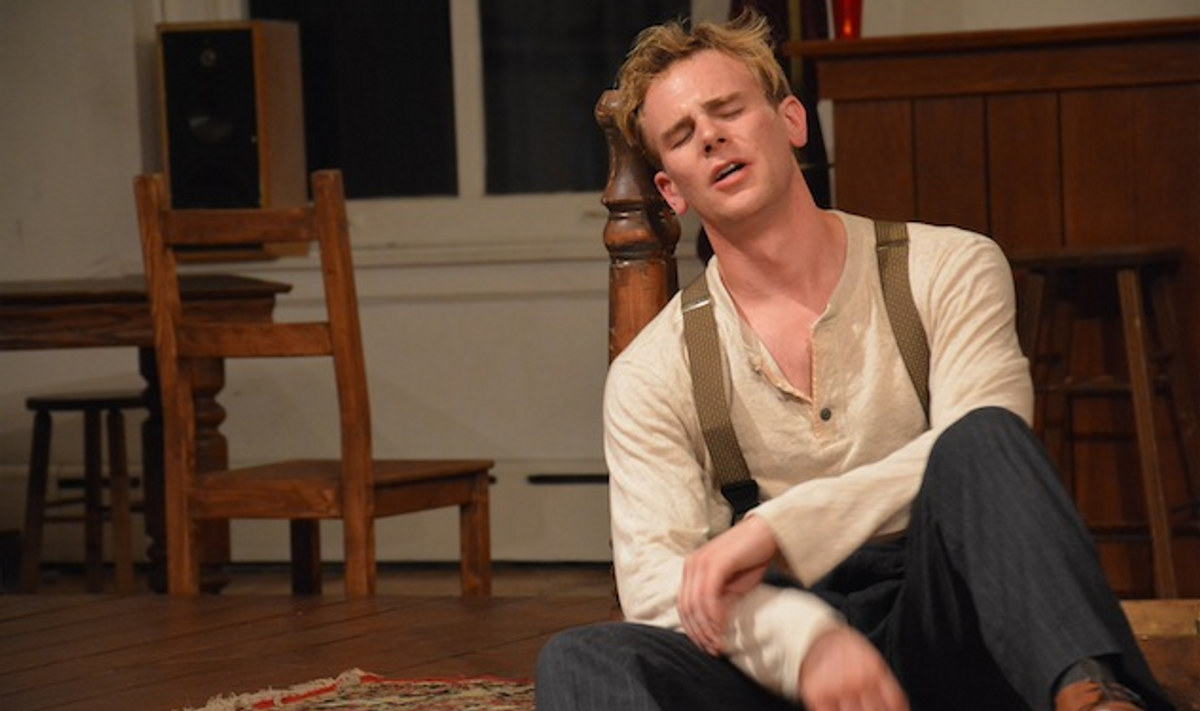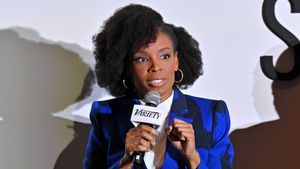Photography by Nikki Delhomme / Tim Hassler as Jack
The play The Importance of Being Ernest Hemingwayis, as the title suggests, a mashup of Oscar Wilde's The Importance of Being Earnest and the life and works of Ernest Hemingway (it runs through Sept. 1 at the Access Theater in New York City). But it veers from its source material most notably when it takes Wilde's familiar work and subverts it, including having Wilde's characters Algernon and Jack become lovers--something that is only hinted at in the original. Here it occurs after a fight full of homoerotic tension straight out of Hemingway, effectively setting the audience on edge.
The play, however, is more than just The Importance of Being Earnest with a twist. All the dialogue was taken from various works of both Wilde and Hemingway, nothing new was added, and so I imagined that anyone unfamiliar with Wilde and Hemingway (or their lives) would either not understand the play, or not enjoy it. Talking to the crowd after the show, however, I discovered that some had not only never read a single sentence by Hemingway, but had never seen The Importance of Being Earnest--let alone knew any of Wilde's other work--but they said they enjoyed the production.
That isn't to say that ones enjoyment of the show would not be greatly enhanced with a literary background.
If someone is unfamiliar with Wilde's double life or his abusive homosexual lover, it helps to understand the Wildeian dandy, the witty and effeminate fop, an ideal of masculinity that Wilde tried to adopt in his life--but at which he ultimately failed. A scene in the play deals with how Bunberry (a fake person created to get out of social situations) should die, committing suicide in spain with a shotgun, or from cerebral meningitis in the mist of a deep depression - mirroring of course, Hemingway and Wilde's own deaths.
The script, created by Elliot B. Quick and James Rutherford, is excellent, taking up the challenge of intersecting the two very different voices of Hemingway and Wilde--Hemingway wrote as a journalist, standing at the typewriter, while Wilde wrote lengthy sentences at a desk pouring over every comma--with grace, style, and wit.
Said in a gruff, manly voice, Wilde's witticisms seem more like Hemingway's disconnected musings on war; and Hemingway's short sharp sentences delivered effeminately and whimsically flow perfectly with the witty banter. Much of this has to do with the compilation of the play by Quick and Rutherford, but also the intense, tight acting and direction. We caught up with Quick and Rutherford to find out what prompted them to tackle this unusual play on masculinity and what to do about that pesky word, "f****t."
 Why Choose Wilde and Hemingway for a mashup?
Why Choose Wilde and Hemingway for a mashup?
James Rutherford: The Importance of Being Earnest was a play that was very important to a lot of us. Earnest--the word earnest was 1890s slang for gay, in London--is he earnest? Is he musical? So there was always something underneath it. Then once you get reading Oscar Wilde's letters to his lover Bosie, you start the realize that The Importance Of Being Earnest is really: Oscar Wilde is Jack and Bosie is Algernon, and it's him working through his abusive relationship.
Elliot Quick: Two weeks after The Importance of Being Earnest premiered, Wilde was in court in the beginning of a series of trials that would put him in jail for two years as the result of this abusive relationship that he had with this man Bosie and you see so many specifics of the relationship between those two men in what Wilde has written between Jack and Algernon .
Rutherford: Then the notion of having a boyfriend and a wife and two kids and what it means to live a double life and what it means to lie to people you love, and how that corrodes your life made it a very serious play. This pun became interesting; that earnest means gay and that it also means seriousness, that you need to live your life in an honest, straightforward upfront way; that you need to look at your problems in your life and confront them, and either you destroy it, or it destroys you. It does not matter which--so long as you are living earnestly and living well. And that is Ernest Hemingway's entire ethos, so couldn't we look to him to find out how to be ernest, truly?
We put those two together, and then we started to realize that there were even deeper, further similarities. The dandy fop, as Wilde created him, was just as much a fictional character as the Hemingway male, that Hemingway wrote into his stories and also tried to live out in his daily life--the kind of stress and strain that comes onto an artist when they try to embody their work, when they try to become the ideal that they write about.
Quick: And what becomes so useful about Ernest Hemingway in terms of unpacking all these things is that Wilde's writing is full of these wonderfully clever epigrams that, hearing them spoken in a british accent by the Wilde fop, we're encouraged not to take very seriously. We think there very clever but we don't actually hear the truth behind them. When you speak those same witticisms with the voice of Ernest Hemingway's terse, declarative prose you start to hear the things that Wilde's actually saying, that for a whole century, we haven't been listening to.
How do you reconcile the two very different styles of Hemingway and Wilde?
Rutherford: Well, we sort of try not to almost. We put them next to each other, there are some texts which is Wilde's text spoken, as though it were Hemingway, and there is some text in the play which is Hemingway's spoke as though it were Wilde. And I think what started to become very interesting is that if you ran them together dramatically it started not to be immediately clear which was and I think that we, well we were hoping that it doesn't exactly reconcile, we're putting these things next to each other because it becomes complicated.
Act 1 seems much more Wilde and Act 2 seems much more Hemingway, was that intentional?
Rutherford: Well Act 2 of the play--which is based on Act 3 of Wilde's play the way we have it together--is a much more disjointed, ugly thing. There is a lot of Hemingway in the first act, but it's sort of peppered in, there aren't such great swathes of it, a line here a line there, and we've hewn relatively close to the structure of Wilde's play in Act 1. And in the second act there is a lot more Hemingway, but there are also bigger sections of other Wilde; there's a long section of De Profundis, there is a long section of Salome, but it's less about transitioning into Hemingway than transitioning into something more jagged and less coherent.
On that note, could you explain the song scene during the second act?
Rutherford: That is The Ballad of Reading Gaol, its an epic poem that's the only thing that Wilde really wrote after prison. It's a long beautiful epic poem about this man who is sentenced to die, and another of the last things he wrote from prison was he wrote this incredible letter called De Profundis, of which there is a long section in here.
Why set it in France, not London or Spain?
Rutherford: It's Hemingway's Paris of The Sun Also Rises and of A Moveable Feast. That was the notion the realism of the play is that these people are like the Ernest Hemingway characters.
The play is very physical, a lot of things get thrown and there is a lot of wrestling and fighting, and that seems sort of detached, both from the way that Hemingway writes and the way Wilde writes.
Rutherford: Hemingway uses space and silence to sort of hide drastic physicality. Hemingway has all these sex scenes that are just denoted by silences and voids and a lot of my work as a director, personally, has been taking ecstatic text and putting it with ecstatic motion see how we can open them up together. I don't think that Hemingway's dialogue is theatrical in that same way because, on the page, it's about so much of what you imagine must be going on that he gives so little of.
So you are filling his silences with action?
Rutherford: To a certain degree, yes.
Quick: Action that's already there, there to be imagined. I don't think it's an intrusion on our part to add it in I think it's just exposing what's already underneath those silences.
Could you talk about the use of the word 'f****t' at the end of the second act?
Rutherford: It comes out in Hemingway in such a curious upsetting, unpleasant way.
Quick: It's a scene in The Sun Also Rises where they're fishing.
Rutherford: The fishing scene, they are having such a good time, it's the first good time you see in the book, where these men just get to be men and be with each other and isn't that wonderful. But it devolves into this miserable, disgusting homophobic awful thing, that we feel OK about, I guess, when we read it. We wanted to lean into that as far as exploring Hemingway. It would be disingenuous of us to explore Hemingway without talking about his homophobia and his anti-Semitism.

From Left: Anne Troup (Gwendolyn), Tim Hassler (Jack), Ross Cowan (Algy), Charlotte Graham (Cecily)
Each act ends with a tender moment between Algernon and Jack, could you explain what you wanted people to walk away with from the first act, and what you wanted them to walk away from the second act and ultimately the play?
Rutherford: I have a radicalized point of view on this. Every time I see The Importance Of Being Earnest, I'm surprised that they don't make out at the end of Act 2; I don't think I'm alone there. The ending of The Importance of Being Earnest is always rough, because it's comedy, it's a serious comedy in that everything needs to get wrapped up and I think part of our treatment of the play came out of that we find that the way Wilde resolves the comedy to be actually quite violent.
The way the women in particular are really shut up Cecily says almost nothing in the last act Gwendoline says almost nothing, and it's just these two men fighting over these women, and this other woman sort of blocking the gate. We found that quite violent. So we were hoping to slow it way down, so we can actually look at all of the problems and see that these are actually difficult to reconcile.
So at the end of the first half of the play, we are hoping that the audience is on board with us; that these men have a secret relationship that they've been keeping from the world and now we all know about it--and we are ultimately going to have to address it. The hope is in ending the part of the play like that, the audience is with us in the way that the audience is unhappy with the way Wilde tries to end him play without dealing with this problem, this relationship.
Then the ending of the play a whole is quite tricky, as was Wilde's life. This man Bosie was responsible for his being thrown in prison, which ruined his health and ended his artistic career, and when he got out, he got back together with him. We can't exactly judge him for that, really, we don't know his relationship and it's a difficult, complicated, rough thing.
I think it's important that Wilde wrote comedies because, him living a double life and living so hard, and having so many secrets, lies and suffering in his life, it became very important that he bring energy and light and joy into the world, so that there is an energy towards the end that we want reconciliation, that we want things to be beautiful even if they aren't quite true. We were struggling to find out how we could get there, how we could be on board with Wilde's project.
During the play its very interesting that, "Oh, there are these hidden meanings to everything and, actually, this is a very sad play on the inside." But if we've gotten to the end of the play and that's all it's meant then it's a whole lot of nothing. So it became important of us to work with Wilde, and in the face of all the lies, to make something beautiful and to make the world beautiful.
I think in struggling with that we found with the ending of The Sun Also Rises, which is that same sentiment, that, "We could have had such a good time together, isn't it pretty to think so," and just because it isn't true doesn't mean it isn't beautiful. It's uncanny that these two artist that are so wildly different on aesthetic levels agree on that: That if you can't have truth, beauty is still important.
For more information on M-34 or the production, visit the website.


































 Why Choose Wilde and Hemingway for a mashup?
Why Choose Wilde and Hemingway for a mashup?























































